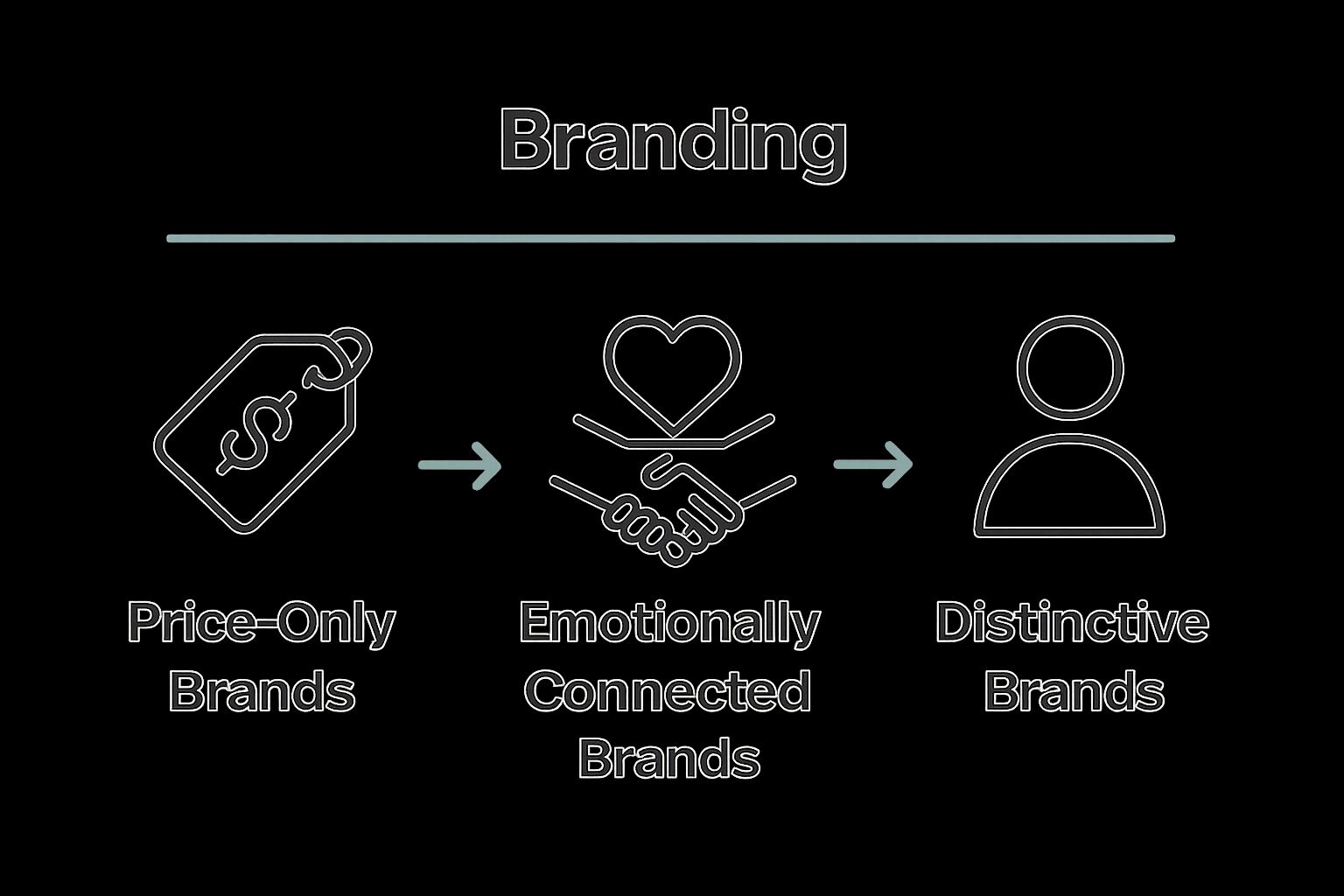What Is Rebranding and Why It Matters

Explore why brand strategy matters for entrepreneurs and businesses seeking clarity, alignment, and client engagement in their brand journey.

Brand strategy shapes how a business communicates its purpose and stands out from competitors. Some folks think branding is only about logos and taglines, but that is just the surface. Companies with a clear brand strategy can command premium pricing and drive deep loyalty, even in markets packed with options. So while everyone is battling for attention, the most successful brands are winning trust and loyalty by building a story customers want to be part of.
Brand strategy represents the comprehensive blueprint that defines how a business communicates its unique value and connects authentically with its target audience. At its core, why brand strategy matters goes far beyond creating a memorable logo or catchy tagline—it’s about constructing a deliberate narrative that differentiates your business and creates meaningful relationships with customers.
A brand strategy is a holistic plan that articulates your business’s fundamental purpose, core values, positioning, and personality. It serves as the strategic foundation that guides all marketing, communication, and operational decisions. Think of it like a compass that ensures every interaction, from your website design to customer service approach, consistently reflects your brand’s authentic identity.
The most powerful brand strategies answer critical questions that transform businesses from generic service providers into memorable, distinctive brands:
Without a clear brand strategy, businesses often find themselves trapped in a cycle of inconsistent messaging, confused audience perceptions, and ineffective marketing efforts. A well-crafted brand strategy provides several critical advantages:
Successful brand strategies transform businesses from transactional service providers into trusted partners. They communicate not just what you do, but why you do it—connecting with customers on a level that transcends simple product features or pricing.
To help clarify the distinct advantages a strong brand strategy provides, the table below summarizes key benefits discussed in the article.
| Benefit | Description |
|---|---|
| Clarity of Purpose | Defines mission and vision, guiding all business activities |
| Competitive Differentiation | Distinguishes your business from crowded competitors |
| Emotional Connection | Builds meaningful relationships and deepens customer trust |
| Higher Perceived Value | Enables premium pricing and communicates unique market value |
| Increased Customer Loyalty | Cultivates lasting commitment and repeat business from engaged customers |
| Consistent Messaging | Ensures communications and actions align with core identity |
| Strategic Growth Alignment | Connects branding efforts directly to business growth and operational focus |

By investing time in developing a robust brand strategy, entrepreneurs and business owners create a powerful framework that guides decision making, attracts ideal customers, and builds long-term brand equity. It’s not about perfection, but about creating a consistent, authentic narrative that resonates with your target audience and sets the foundation for sustainable business growth.
In today’s hyperconnected business environment, why brand strategy matters has never been more critical. Companies are no longer competing solely on product quality or price—they are battling for attention, trust, and emotional connection in a crowded marketplace where customers are bombarded with choices every second.
A robust brand strategy functions as your business’s unique fingerprint, distinguishing you from countless competitors who might offer similar products or services. It transforms your brand from being just another option to becoming a compelling choice that resonates with your target audience’s deeper needs and aspirations.
When businesses lack a clear strategic approach, they often blend into the background, becoming indistinguishable from their competitors. This invisibility leads to several significant challenges:
Below is a table highlighting how strong versus weak brand strategies impact business outcomes, helping readers quickly compare their effects in a competitive market.
| Brand Strategy Quality | Customer Loyalty | Perceived Value | Market Position | Pricing Power |
|---|---|---|---|---|
| Strong | High (deep loyalty) | High (premium prices) | Clear and differentiated | Ability to command |
| Weak | Low (minimal repeat) | Low (compete on price) | Generic, indistinguishable | Forced to discount |
Consumers are increasingly making purchasing decisions based on emotional connections and perceived brand values. A well-crafted brand strategy communicates your organization’s fundamental beliefs, mission, and commitment to your audience. This transparency creates a powerful psychological bridge that transforms transactional relationships into genuine trust.
The most successful brands understand that positioning is not about being everything to everyone, but about being authentically significant to a specific audience. By clearly articulating your unique value proposition, you attract customers who fundamentally align with your brand’s purpose and principles.
Strategic brand positioning allows businesses to:
In a competitive market, your brand strategy becomes your most potent competitive weapon. It’s not just about selling a product—it’s about telling a story that inspires, connects, and ultimately transforms casual observers into passionate brand advocates.
Why brand strategy matters extends far beyond visual aesthetics—it directly influences how customers perceive, interact with, and ultimately commit to a business. Strategic brand development creates an emotional connection that transforms casual interactions into deep, lasting relationships.
Customer engagement begins with understanding that people do not merely purchase products or services—they invest in experiences and identities that align with their personal values and aspirations. A well-crafted brand strategy communicates a narrative that transcends transactional exchanges, speaking directly to customers’ core beliefs and desires.
Consistent brand experiences build psychological trust through predictability and authenticity. When customers encounter a brand that demonstrates unwavering commitment to its stated values across every interaction, they develop a sense of reliability and emotional attachment.
Key elements that drive deep customer connection include:
Successful brand strategies convert customers from passive consumers into active brand champions. This transformation happens when businesses move beyond selling products and start cultivating meaningful relationships that make customers feel genuinely understood and valued.
Customers who feel emotionally connected to a brand are more likely to:
The most powerful brand strategies recognize that loyalty is earned through consistent, meaningful experiences that make customers feel seen, respected, and integral to the brand’s journey. By creating a narrative that extends beyond transactions, businesses transform customers from one-time buyers into passionate, long-term supporters who become essential to sustainable growth.
Why brand strategy matters goes beyond marketing—it serves as a critical bridge connecting your business vision with tangible operational outcomes. A truly effective brand strategy becomes the strategic framework that ensures every organizational effort moves in a cohesive, purposeful direction.
Successful businesses recognize that brand strategy is not a standalone activity, but an integrated system that touches every aspect of organizational performance. When brand strategy aligns perfectly with business objectives, companies create a powerful synergy that amplifies their competitive advantage and accelerates growth.
This alignment requires more than surface-level coordination. It demands a deep, holistic understanding of how brand positioning influences strategic decision making across multiple business domains:
A unified brand strategy transforms organizational complexity into streamlined, purposeful action. By establishing clear guidelines that connect brand identity with business goals, companies create a shared language and framework that empowers teams to make aligned, intelligent decisions.
The most effective brand strategies do more than describe external perceptions—they become internal compasses that guide:
Companies that master this integration turn their brand from a marketing concept into a powerful operational catalyst. They create an environment where every team member understands not just what they are doing, but why it matters—generating extraordinary levels of organizational clarity, motivation, and strategic focus.
Ultimately, aligning brand strategy with business goals is about creating a seamless narrative that connects external market perception with internal organizational capabilities. It transforms brand from a peripheral concept into the central nervous system of business growth and transformation.
Why brand strategy matters becomes crystal clear when examining companies that have transformed their market position through deliberate, thoughtful brand positioning. These real-world examples demonstrate how strategic brand development can elevate businesses from ordinary to extraordinary.
Companies that embed their core purpose into their brand strategy create powerful connections that transcend traditional marketing approaches. These organizations understand that modern consumers seek more than products—they want meaningful relationships with brands that reflect their own values and aspirations.
Successful purpose-driven brands share several fundamental characteristics:
Brands that successfully differentiate themselves do more than highlight product features—they create unique emotional narratives that resonate deeply with their target audience. These organizations understand that positioning is about crafting a distinctive identity that makes customers feel understood and inspired.
Key strategies for innovative brand positioning include:
These approaches transform brand strategy from a theoretical concept into a powerful operational tool. By developing a clear, authentic narrative that communicates unique value, businesses can create extraordinary connections that drive customer loyalty, increase market share, and generate sustainable competitive advantages.
Ultimately, successful brand strategies are not about perfection—they are about creating genuine, meaningful connections that make customers feel genuinely seen, understood, and valued. They represent a sophisticated approach to business growth that recognizes the profound human desire to connect with something larger than a simple transaction.

You have seen how a strong brand strategy sets the stage for real growth—offering clarity, differentiation, and authentic connections with your audience. If you feel stuck in cycles of inconsistent messaging or find that your marketing efforts are scattered, it is time to bring focus and impact to your business. At Reasonate Studio, we understand the power of a strategic approach that turns small businesses and side hustles into trusted, memorable brands.

Imagine having a proven system that uncovers the heart of your brand, clarifies your message, and aligns your marketing actions with what matters most. The proprietary Aligned Impact Model™ can help you build confidence in every decision while making a measurable difference in your results. Do not let another year go by with strategies that fail to resonate. Visit Reasonate Studio today to start aligning your brand with your biggest goals. You can learn more or get started in a way that fits your stage of business.
Brand strategy is a comprehensive plan that articulates a business’s fundamental purpose, core values, positioning, and personality. It acts as a guiding framework for marketing, communication, and operational decisions, ensuring consistency in how a business presents itself to its audience.
A clear brand strategy is vital because it provides clarity of purpose, helps differentiate a business from competitors, and fosters emotional connections with customers. This clarity leads to more effective marketing efforts and stronger customer loyalty.
Brand strategy influences customer engagement by creating emotional resonance and aligning brand values with customer beliefs. This connection transforms casual interactions into deeper relationships, encouraging customers to become loyal advocates for the brand.
A brand strategy can drive business growth by aligning marketing efforts with business goals, enhancing customer loyalty, and creating meaningful differentiation in the market. A strong brand identity attracts ideal customers and builds long-term brand equity.